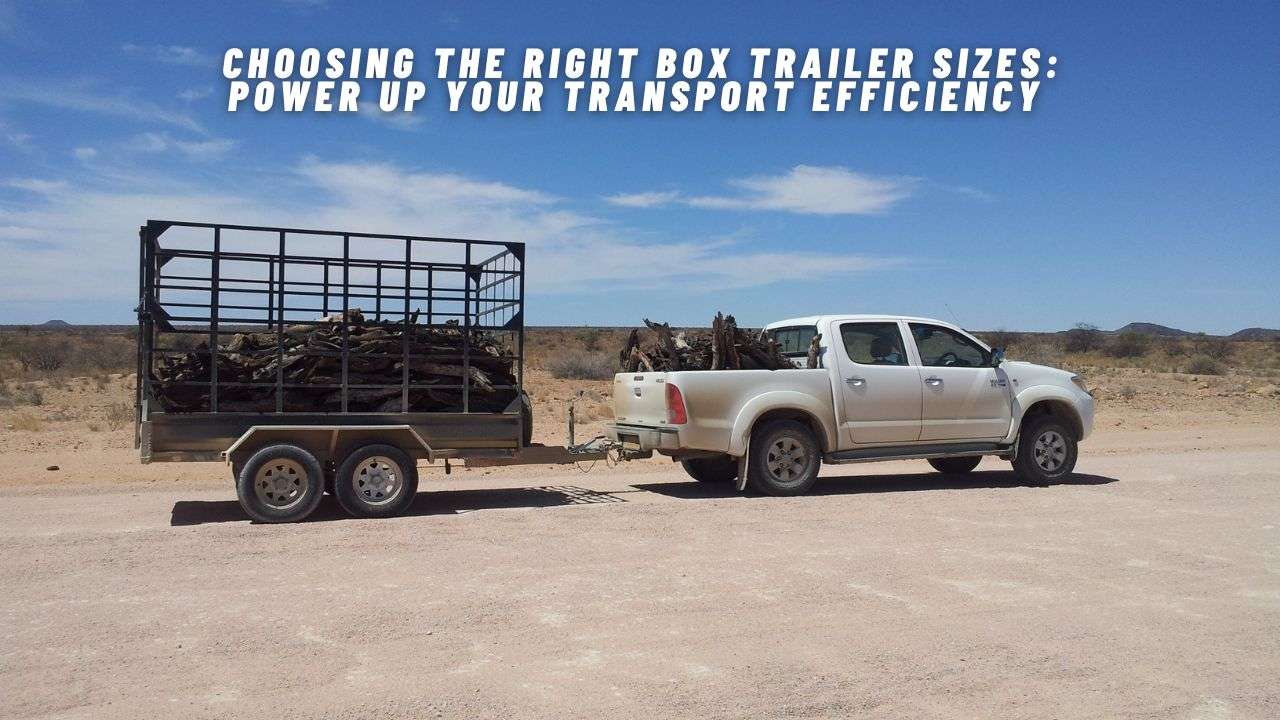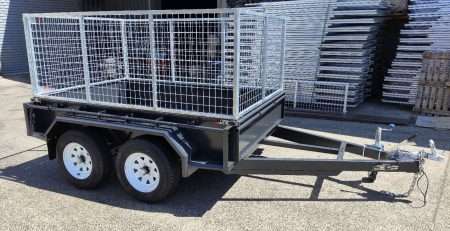
Choosing the Right Box Trailer Sizes: Power Up Your Transport Efficiency
Box Trailer Sizes: An Overview
When it comes to choosing the right box trailer size, it’s important to understand the dimensions and common lengths available. Box trailers come in various sizes, catering to different hauling needs and requirements.
Understanding Box Trailer Dimensions
Box trailers are characterised by their rectangular shape, providing a secure and enclosed space for transporting goods. The dimensions of box trailers typically refer to their width, length, and height. The width can vary from 4 feet to 8.5 feet, while the length ranges from 6 feet to 32 feet (Renown Cargo Trailers).
Common Box Trailer Lengths
The length of a box trailer is an important consideration, as it determines the amount of cargo that can be transported. Box trailers come in various lengths to accommodate different hauling needs. The most common box trailer size is 53 feet in length, which is often used for long-haul shipments (PLS Logistics Services). This length provides ample space for large and bulky items.
For smaller or local hauls, box trailers with lengths of 28 feet or 48 feet are commonly used (PLS Logistics Services). These trailers are ideal for transporting goods within a specific region or for shorter distances.
To give you a better idea of the range of box trailer lengths available, here are some common sizes:
| Box Trailer Length | Typical Use |
|---|---|
| 28 feet | Local or regional hauls |
| 48 feet | Local or regional hauls |
| 53 feet | Long-haul shipments |
Figures courtesy of PLS Logistics Services
It’s important to note that these lengths are just a few examples, and box trailers can come in a variety of other sizes. The specific length you choose should depend on the type and quantity of cargo you need to transport.
By understanding the dimensions and common lengths of box trailers, you can make an informed decision when selecting the right trailer size for your hauling needs. Whether you’re looking for a utility trailer, enclosed trailer, or cargo trailer, considering the dimensions and lengths will help ensure that you have the right box trailer for your transportation requirements.
Choosing the Right Box Trailer Size
When it comes to selecting the appropriate box trailer size, there are several factors to consider. Whether you are a small business owner, a transport company, or an individual in need of a trailer, it’s essential to choose the right size to meet your specific requirements. Let’s explore the factors to consider and the options available for small, medium, and large box trailers.
Factors to consider
Before deciding on a box trailer size, it’s important to assess your specific needs and requirements. Consider the following factors:
Cargo Type: Determine the type and dimensions of the cargo you intend to transport. This will help you determine the appropriate size and weight capacity of the trailer.
Payload Capacity: Calculate the total weight of your cargo, including any additional equipment or materials. Ensure that the trailer you choose has a sufficient payload capacity to accommodate your cargo without exceeding weight restrictions.
Usage Frequency: Consider how frequently you will be using the trailer. If you require a trailer for regular use, investing in a larger size may be more cost-effective in the long run.
Storage Space: Evaluate the availability of storage space for the trailer when it’s not in use. If limited space is a concern, choosing a smaller trailer may be more practical.
Small Box Trailers
Small box trailers are ideal for local or regional hauls, as they offer manoeuvrability and ease of use. These trailers are commonly used for transporting smaller loads or goods. The most common small box trailer size is 6×12 ft, which provides ample space for hauling small household items or motorcycles (Mickey Parts).
Medium Box Trailers
Medium-box trailers strike a balance between size and versatility. They are suitable for a wide range of cargo, including furniture, appliances, or multiple motorcycles. The recommended sizes for medium box trailers are typically 7×14 ft or 7×16 ft, offering more space to accommodate larger items (Mickey Parts).
Large Box Trailers
For long-haul shipments or when you need to transport larger quantities of goods, large box trailers are the preferred choice. The most common size for large box trailers is 53 feet in length, offering significant capacity for cargo. These trailers are often used for transporting goods over long distances (PLS Logistics Services).
When selecting a large box trailer, it’s important to ensure compliance with local laws and regulations regarding length restrictions, width limitations, and height regulations. Familiarize yourself with the specific requirements in your area to avoid any legal issues (Virginia Trailer Laws).
By considering the factors mentioned above, you can make an informed decision on the appropriate box trailer size for your specific needs. Whether you opt for a small, medium, or large box trailer, be sure to choose a reputable manufacturer and consider additional features and accessories that may enhance the functionality and convenience of your trailer.
Customisation Options for Box Trailers
When it comes to box trailers, one of their major advantages is the ability to customise them to suit specific needs. Whether you’re looking for a utility trailer, an enclosed trailer, or a cargo trailer, additional features and accessories can be added to tailor the trailer to your requirements.
Additional Features and Accessories
Box trailers are versatile and can be customised with a range of additional features and accessories to enhance their functionality and convenience. Some common options include:
Windows: Adding windows to the sides or rear of the trailer can provide natural light and ventilation, making it easier to see inside and ensuring proper airflow.
Vents: Installing vents can help regulate temperature and reduce humidity inside the trailer, keeping the contents in optimal condition.
Interior Lighting: Adding interior lighting can improve visibility when loading and unloading, especially in low-light conditions or during nighttime operations.
Tie-Down Points: Incorporating tie-down points inside the trailer allows for secure transportation of goods, preventing shifting or damage during transit.
Shelving and Racks: Installing shelves or racks can optimise storage space and organisation, making it easier to arrange and access items within the trailer.
Locking Mechanisms: Enhancing the security of the trailer with robust locking mechanisms provides peace of mind, knowing that your cargo is protected against theft.
Ramps: When hauling items like ATVs or motorcycles, adding a ramp can simplify the loading and unloading process, ensuring safe and efficient transportation.
Tailoring the Trailer to Your Needs
When customising a box trailer, it’s important to consider your specific needs and the intended use of the trailer. For example, if you plan to use it for transporting delicate or temperature-sensitive items, features like insulation or climate control systems may be beneficial.
Additionally, the size and weight capacity of the trailer should be taken into account when choosing accessories. Ensure that any modifications made do not exceed the maximum weight capacity or compromise the stability and safety of the trailer.
By working with reputable trailer manufacturers or dealers, you can explore the customisation options available for the box trailer for sale that best suit your needs. They can provide expert advice on the available features and guide you in selecting the most suitable customisation options based on your requirements.
Remember to factor in the cost and practicality of the additional features and accessories. It’s essential to strike a balance between functionality, budget, and efficiency. By tailoring your box trailer to your specific needs, you can optimize its capabilities and maximize transport efficiency. For more information on box trailer dimensions and weight, check out our article on box trailer dimensions and box trailer weight.
Box Trailer Size Comparison
When considering box trailer sizes, it’s important to compare and understand the width and length options available. Additionally, exploring the versatility of box trailers can help you determine which size will best suit your needs.
Width Options
Box trailers come in a range of widths, providing flexibility for various hauling requirements. The width of a box trailer typically ranges from 4 feet to 8.5 feet. Here are some common width options:
| Width (ft) | Common Uses |
|---|---|
| 4 | Small cargo or personal items |
| 5 | Motorcycles, ATVs, or small furniture |
| 6 | Furniture, appliances, or multiple motorcycles |
| 7 | Larger furniture, appliances, or multiple motorcycles |
| 8.5 | Heavy-duty hauling, construction equipment, or vehicles |
Figures courtesy Renown Cargo Trailers
The width of the box trailer you choose will depend on the size and type of cargo you plan to transport. Keep in mind that wider trailers provide more space, but they may also require additional permits or have restrictions in some areas. Consider your specific needs and any legal considerations when selecting the width of your box trailer.
Length Options
Box trailers also vary in length, allowing you to choose the size that best accommodates your cargo. The length of box trailers typically ranges from 6 feet to 32 feet (Renown Cargo Trailers). Here are some common length options:
| Length (ft) | Common Uses |
|---|---|
| 6 | Small household items or motorcycles |
| 12 | Furniture, appliances, or multiple motorcycles |
| 14 | Larger furniture, appliances, or multiple motorcycles |
| 20 | Furniture, vehicles, or equipment |
| 28+ | Heavy-duty hauling, construction equipment, or vehicles |
Figures courtesy Renown Cargo Trailers
The length of the box trailer you choose will depend on the volume and size of the cargo you need to transport. Smaller trailers are ideal for local or regional hauls, while larger trailers are often used for long-haul shipments. Consider the nature of your transportation needs and the size of the items you plan to haul when selecting the length of your box trailer.
Versatility of Box Trailers
One of the key advantages of box trailers is their versatility. Box trailers can be customized and equipped with various features and accessories to meet specific requirements. Whether you need a utility trailer for general-purpose hauling, an enclosed trailer for added security, or a cargo trailer for specialized transportation, there are options available to suit your needs.
By understanding the width and length options of box trailers and considering the versatility they offer, you can make an informed decision when choosing the right size for your specific requirements. Remember to consult any applicable legal considerations, such as Virginia trailer laws, length restrictions, width limitations, and height regulations to ensure compliance and safe transportation.
Legal Considerations for Box Trailer Sizes
When selecting a box trailer for your transportation needs, it’s essential to be aware of the legal considerations and regulations regarding trailer sizes. This ensures compliance with the law and promotes safe and efficient transportation. In the state of Virginia, specific trailer laws are in place to govern the length, width, and height of trailers.
Virginia Trailer Laws
Virginia has regulations in place to govern the operation of trailers on highways. According to Virginia law, no motor vehicle longer than 40 feet shall be operated on any highway in the Commonwealth of Virginia, except for buses and motor homes. The total length of any combination of vehicles, including motor homes and buses, coupled together, including any load thereon, shall not exceed 65 feet. However, it’s important to note that the Commissioner of Highways may impose restrictions on the operation of vehicles exceeding 65 feet in length on certain roads based on safety and engineering analysis.
In addition, specific limitations are imposed on individual semitrailers and trailers being drawn in a tractor truck semitrailer trailer combination. No individual semitrailer or trailer being drawn in a tractor truck semitrailer trailer combination shall exceed 28 1/2 feet in length. Semitrailers being operated in a tractor truck semitrailer combination shall not exceed 48 feet in length, except when the distance between the kingpin of the semitrailer and the rearmost axle or a point midway between the rear tandem axles is not more than 41 feet. In such cases, the semitrailer may be allowed a maximum length of 53 feet (Virginia Law).
Length Restrictions
The length limitations for trailers in Virginia are exclusive of safety and energy conservation devices, steps and handholds for entry and egress, rubber dock guards, flexible fender extensions, mudflaps, refrigeration units, and air compressors (Virginia Law). It’s crucial to consider these additional elements when calculating the overall length of your trailer to ensure compliance with the law.
Width Limitations
While specific width limitations are not mentioned in the available context, it is important to note that trailers should not exceed the standard width limit for road vehicles, which is typically 8 feet and 6 inches (102 inches) wide in most states. However, it is recommended to consult local regulations and laws to ensure compliance with any specific width limitations in Virginia.
Height Regulations
The available context does not provide specific information regarding height regulations for trailers in Virginia. However, it’s important to consider the overall height of your trailer to ensure clearance under bridges, overpasses, and other structures during transportation.
Understanding and adhering to these legal considerations for box trailer sizes is essential to avoid any legal penalties and to ensure safe and lawful operation of your trailer in Virginia. It’s always a good idea to consult the relevant authorities or seek professional guidance to ensure compliance with the specific regulations in your area.
Author
I am Rahatul Ashiq Tamal. Another author of Muscle Trailers. Muscle Trailers is a well-known trailer brand in Sydney, Melbourne & Adelaide

How to Mount a Spare Tire on Your Trailer: A Simple Step-by-Step Guide
Trailer service centers receive over 1 million phone calls and 1.3 million emails each year about trailer maintenance problems....

How to Fix RV Roof Leaks: Simple Roof Leak Detection Guide for Beginners
Did you know DIY RV roof repairs can cost under $50? But undetected leaks could lead to substantially higher repair...

Starting a Food Truck Business in Australia: From Trailer Selection to Launch
The Australian mobile food market has evolved into a billion-dollar industry. This makes a food truck...
